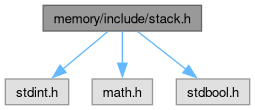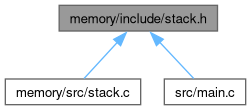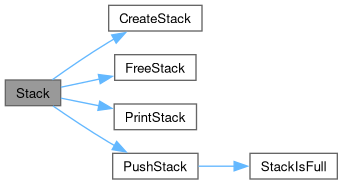#include <stdint.h>#include <math.h>#include <stdbool.h>

Go to the source code of this file.
Data Structures | |
| struct | stack |
Macros | |
| #define | STACK_NO_VALUE (stack_value_t)INFINITY |
Typedefs | |
| typedef float | stack_value_t |
| typedef struct stack | mystack_t |
Functions | |
| mystack_t * | CreateStack (uint32_t capacity) |
| Create a Stack object. | |
| mystack_t * | FreeStack (mystack_t *stack) |
| Free the memory of a given Stack object. | |
| bool | StackIsEmpty (mystack_t *stack) |
| Check if the Stack object is empty. | |
| bool | StackIsFull (mystack_t *stack) |
| Check if the Stack object is full. | |
| void | PushStack (mystack_t *stack, stack_value_t value) |
| Push a new object to the stack. | |
| stack_value_t | PopStack (mystack_t *stack) |
| Pop the object on top of the stack. | |
| stack_value_t | TopStack (mystack_t *stack) |
| Return the top object of the stack. | |
| void | PrintStack (mystack_t *stack) |
| Print the whole stack. | |
| void | Stack () |
Macro Definition Documentation
◆ STACK_NO_VALUE
| #define STACK_NO_VALUE (stack_value_t)INFINITY |
Definition at line 10 of file stack.h.
Referenced by PopStack(), and TopStack().
Typedef Documentation
◆ mystack_t
◆ stack_value_t
| typedef float stack_value_t |
Function Documentation
◆ CreateStack()
| mystack_t * CreateStack | ( | uint32_t | capacity | ) |
Create a Stack object.
- Parameters
-
capacity
- Returns
- stack_t*
Definition at line 14 of file stack.c.
References stack::capacity, stack::data, and stack::size.
Referenced by Stack().

◆ FreeStack()
Free the memory of a given Stack object.
- Parameters
-
stack
- Returns
- stack_t*
Definition at line 43 of file stack.c.
References stack::data.
Referenced by Stack().

◆ PopStack()
| stack_value_t PopStack | ( | mystack_t * | stack | ) |
Pop the object on top of the stack.
- Parameters
-
stack
- Returns
- stack_value_t
Definition at line 102 of file stack.c.
References stack::data, stack::size, STACK_NO_VALUE, and StackIsEmpty().

◆ PrintStack()
| void PrintStack | ( | mystack_t * | stack | ) |
Print the whole stack.
- Parameters
-
stack
Definition at line 129 of file stack.c.
References stack::capacity, stack::data, and stack::size.
Referenced by Stack().

◆ PushStack()
| void PushStack | ( | mystack_t * | stack, |
| stack_value_t | value ) |
Push a new object to the stack.
- Parameters
-
stack
Definition at line 85 of file stack.c.
References stack::data, stack::size, and StackIsFull().
Referenced by Stack().


◆ Stack()
| void Stack | ( | ) |
Definition at line 148 of file stack.c.
References CreateStack(), FreeStack(), PrintStack(), and PushStack().
Referenced by FunctionCall().


◆ StackIsEmpty()
| bool StackIsEmpty | ( | mystack_t * | stack | ) |
Check if the Stack object is empty.
- Parameters
-
stack
- Returns
- true
- false
Definition at line 63 of file stack.c.
References stack::size.
Referenced by PopStack(), and TopStack().

◆ StackIsFull()
| bool StackIsFull | ( | mystack_t * | stack | ) |
Check if the Stack object is full.
- Parameters
-
stack
- Returns
- true
- false
Definition at line 75 of file stack.c.
References stack::capacity, and stack::size.
Referenced by PushStack().

◆ TopStack()
| stack_value_t TopStack | ( | mystack_t * | stack | ) |
Return the top object of the stack.
- Parameters
-
stack
- Returns
- stack_value_t
Definition at line 117 of file stack.c.
References stack::data, stack::size, STACK_NO_VALUE, and StackIsEmpty().
